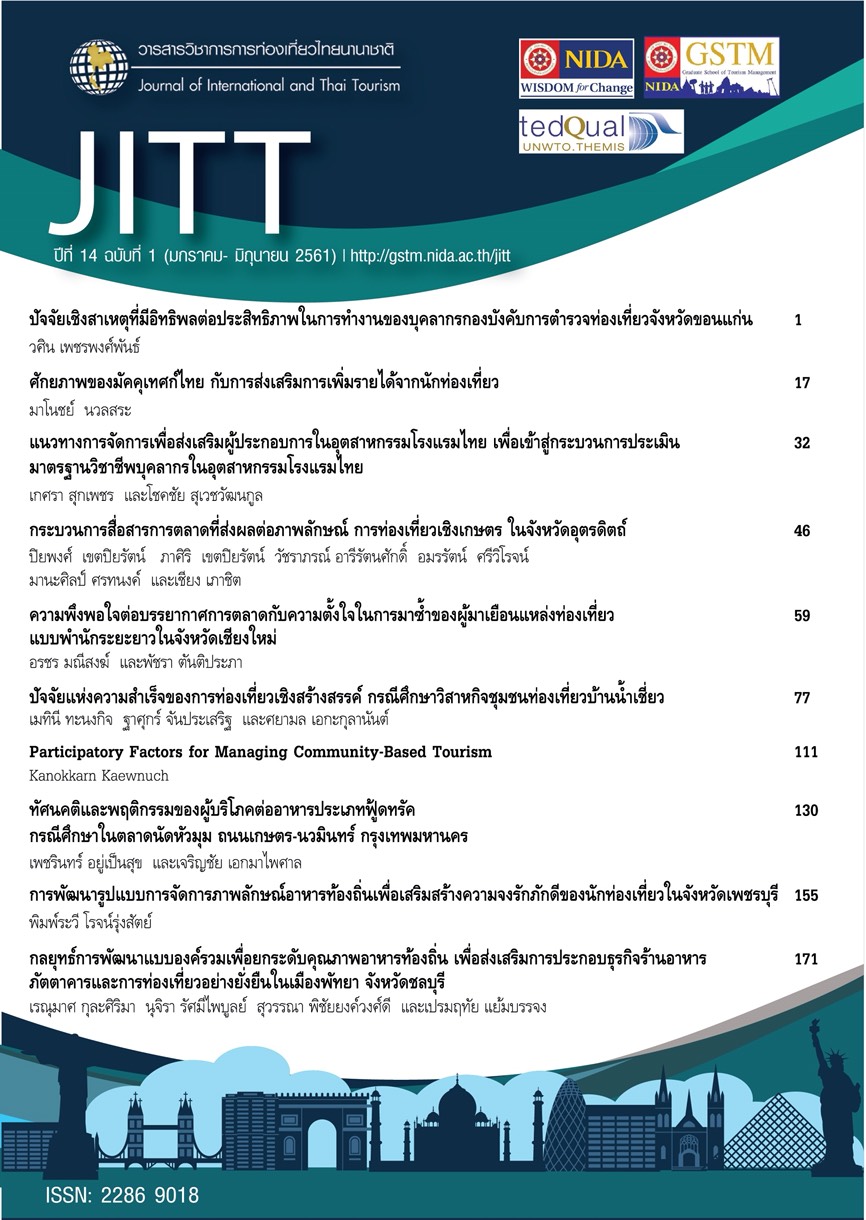ปัจจัยเชิงสาเหตุที่มีอิทธิพลต่อประสิทธิภาพในการท างานของบุคลากร กองบังคับการตำรวจท่องเที่ยวจังหวัดขอนแก่น
Main Article Content
บทคัดย่อ
การวิจัยนี้มีวัตถุประสงค์เพื่อ (1) ศึกษาปัจจัยทางพฤติกรรมการเป็นสมาชิกที่ดีในองค์กร การรับรู้ถึงความ
ยุติธรรมในองค์กร และการรับรู้การสนับสนุนจากองค์กรที่มีอิทธิพลต่อประสิทธิภาพในการท างาน (2) เพื่อ
ศึกษาปัจจัยทางการรับรู้ถึงความยุติธรรมในองค์กร และการสนับสนุนจากองค์กรที่มีอิทธิพลต่อพฤติกรรมการ
เป็นสมาชิกที่ดีในองค์กร (3) ตรวจสอบความสอดคล้องกลมกลืนของโมเดลปัจจัยเชิงสาเหตุที่มีอิทธิพลต่อ
ประสิทธิภาพในการท างาน กลุ่มตัวอย่างที่ใช้ใครการวิจัยครั้งนี้คือ เจ้าหน้าที่ต ารวจท่องเที่ยวกองบังคับการ
ต ารวจท่องเที่ยว (ขอนแก่น) จ านวน 146 คน โดยใช้แบบสอบถามเป็นเครื่องมือซึ่งมีค่าน้ าหนักองค์ประกอบ
(Factor Loadings) อยู่ระหว่าง .892 - .956 และมีค่าสัมประสิทธิ์แอลฟา ครอนบาค(Cronbach’s alphas
coefficient) อยู่ระหว่าง .905 - .952 วิเคราะห์ข้อมูลโดยใช้โมเดลสมการโครงสร้าง (SEM)
ผลการวิจัยพบว่า (1) พฤติกรรมการเป็นสมาชิกที่ดีในองค์กรมีอิทธิพลทางบวกต่อประสิทธิภาพในการ
ท างานอย่างมีนัยส าคัญทางสถิติที่ระดับ .05 การรับรู้ถึงความยุติธรรมในองค์กรมีอิทธิพลทางบวกต่อ
ประสิทธิภาพในการท างานอย่างมีนั ยส าคัญทางสถิติที่ระดับ .001 และ การรับรู้ถึงการสนับสนุนจากองค์กรมี
อิทธิพลทางบวกต่อประสิทธิภาพในการท างานอย่างมีนัยส าคัญทางสถิติที่ระดับ .01 (2) การรับรู้ถึงความ
ยุติธรรมในองค์กรอิทธิพลทางบวกต่อพฤติกรรมการเป็นสมาชิกที่ดีในองค์กรอย่างมีนัยส าคัญทางสถิติที่
ระดับ .001 และการรับรู้ถึงการสนับสนุนจากองค์กร มีอิทธิพลทางบวกต่อพฤติกรรมการเป็นสมาชิกที่ดีใน
องค์กรอย่างมีนัยส าคัญทางสถิติที่ระดับ .05 (3) ผลตรวจสอบความสอดคล้องกลมกลืนของโมเดลพบว่า มี
ความสอดคล้องกับข้อมูลเชิงประจักษ์พบว่าโมเดลมีความเหมาะสมพอดีกับข้อมูลเชิงประจักษ์อยู่ในเกณฑ์ดี
(χ2/df = 1.257, p = .074, GFI = .923, AGFI = .901, CFI= .992, RMSEA = .042)
Article Details
เอกสารอ้างอิง
พ.ศ. 2560-2564 เข้าถึงเมื่อ 7 พฤศจิกายน 2560. เข้าถึงได้จาก https://www.mots.go.th
/ewt_dl_link.php?nid=9692 ไม่พบในรายการอ้างอิงในเนื้อหาบทความ (หน้าที่ 7)
กองบัญชาการต ารวจท่องเที่ยว. (2560). อ านาจหน้าที่ในประปฏิบัติงานของกองบัญชาการต ารวจท่องเที่ยว.
เข้าถึงเมื่อ 7 พฤศจิกายน 2560. เข้าถึงได้จาก https://www.thailandtouristpolice.com
กัลยา วานิชย์บัญชา. (2557). การวิเคราะห์สถิติ: สถิติส าหรับการบริหารและการวิจัย (พิมพ์ครั้งที่ 7).
กรุงเทพฯ: ภาควิชาสถิติ คณะพาณิชยศาสตร์และการบัญชี จุฬาลงกรณ์มหาวิทยาลัย.
จันจิราภรณ์ ปานยินดี, จิราวรรณ คงคล้าย และ วิโรจน์ เจษฎาลักษณ์. (2559). ตัวแบบความสัมพันธ์เชิง
สาเหตุระหว่างจริยธรรมองค์การ และพฤติกรรมการเป็นสมาชิกที่ดี ที่ส่งผลต่อประสิทธิภาพในการ
ท างานทางวิชาการของอาจารย์มหาวิทยาลัยราชภัฏ. วารสารปัญญาภิวัฒน์, 8, 156-171
ฉันธะ จันทะเสนา. (2559). อิทธิพลของธรรมาภิบาลต่อพฤติกรรมการเป็นสมาชิกที่ดีขององค์การของพนักงาน
มหาวิทยาลัยราชภัฎ. วารสารวิชาการมหาวิทยาลัยธนบุรี, 10(21), 92-103.
ชัยนันต์ ไชยเสน. (2559). ประเด็นท้าทายและแนวทางประสบความส าเร็จในการควบคุมต้นทุนอาหารและ
เครื่องดื่มในธุรกิจโรงแรม.วารสารวิชาการการท่องเที่ยวไทยนานาชาติ, 12(1), 23-45
บดินทร์ หาญบุญทรง และ พวงเพชร์ วัชรอยู่. (2555). ปัจจัยส่วนบุคคล บุคลิกภาพองค์ประกอบ การรับรู้การ
สนับสนุนขององค์การกับพฤติกรรมการเป็นสมาชิกที่ดีขององค์การ ของข้าราชการในส านักงาน
ปลัดกระทรวงมหาดไทย. สังคมศาสตร์และมนุษย์ศาสตร์, 38(1), 180-198.
ปพฤกษ์บารมี อุตสาหะวาณิชกิจ. (2559). การวัดผลการด าเนินงานแบบบูรณาการของธุรกิจการเงินในประเทศ
ไทย: ผลกระทบของความยุติธรรมในองค์กร การมุ่งเน้นการเรียนรู้ และความเป็นพลวัตรของ
สภาพแวดล้อม.วารสารวิทยาการจัดการสมัยใหม่, 9(2), 13-25.
วรรณชัย ธุระแพง และ วิโรจน์ เจษฎาลักษณ์. (2559). ผลกระทบของการรับรู้การสนับสนุนจากองค์กรที่มีต่อ
ประสิทธิผลการปฏิบัติงานผ่านการปฏิบัติตาม วัฒนธรรมองค์กรแบบ BEST ของพนักงานบริษัท ไทย
รวมสนิพัฒนาอุตสาหกรรม จ ากัด. สาขามนุษยศาสตร์ สังคมศาสตร์ และศิลปะ, 9(1),
733-747.
ศิริมา ตันติธ ารงวุฒิ, มนตรี พิริยะกุล และ นรพล จินันท์เดช. (2559). อิทธิพลตัวแปรคั่นกลางพหุขนานของ
ความผูกพันต่อองค์การ การรับรู้ความยุติธรรมในองค์การ และความพึงพอใจในงานที่ถ่ายทอด
อิทธิพลของการรับรู้ภาวะผู้ใฝ่บริการสู่พฤติกรรมการเป็นสมาชิกที่ดีต่อบุคลากรสถาบันอุดมศึกษา
เอกชน. วารสารดุษฎีบัณฑิตทางสังคมศาสตร์, 6(2), 102-111.
Blau, P. M. (1964). Exchange and power in social life. New York, NY: John Wiley.
Bollen, K.A. (1989). Structural Equations with Latent Variables, New York: John Wiley and
Sons.Cropanzano, R., & Mitchell, M. S. (2005). Social exchange theory: An interdisciplinary review.
Journal of Management, 31(6), 874-900.
Dubinsky, A. J. , & Mattson, B. E. ( 1979) . Consequences of role conflict and ambiguity
experienced by retail salespeople. Journal of Retailing, 55(Winter), 70-86.
Eisenberger, R., Armeli, S Rexwinkel, B., Lynch, P.D., & Rhoades L. (2001). Reciprocation of
Perceived Organizational Support. Journal of Applied Psychology, 86 (1), 42-51.
Eisenberger, R., Huntington, R., Hutchison, S. & Sowa, D. (1986) . Perceived Organizational
Support. Journal of Applied Psychology, 71(3), 500-507.
Folger, R., Cropanzano, R., & Goldman, B. (2005). Justice, accountability, and moral sentiment:
The deontic response to “foul play” at work. In J. Greenberg & J. Colquitt (Eds.),
Handbook of organizational justice, 1, 215-245.
Greenberg, J. ( 1990) Organizational Justice: Yesterday, Today, and Tomorrow. Journal of
Management, 16, 399-432
Hair, J. F., Anderson, R. E., Jatham, R. L. & Black, W. C. (1998). Multivariate Data Analysis (5th
ed.). Upper Saddle River, NJ: Prentice Hal
Hair, J., Black, W., Babin, B. & Anderson, R. (2010). Multivariate Data Analysis, 7th ed., Prentice
Hall.
Hair, J., Black, W., Babin, B., Anderson, R., & Tatham, R. (2006). Multivariate data analysis (6th
ed.). Uppersaddle River, N.J.: Pearson Prentice Hall.
Harrington, James R. & Lee, Ji Han. (2015). What Drives Perceived Fairness of Performance
Appraisal? Exploring the Effects of Psychological Contract Fulfillment on Perceived
Fairness of Performance Appraisal in U. S. Federal Agencies. Public Personnel
Employees’ Management, 44(2), 214– 238.
Kline, R. B. (2011). Principles and practice of structural equation modeling (3rd ed.). NY: The
Guilford Press.
Lavelle, J. J., Brockner, J., Konovsky, M. A., Price, K. H. & Henley, A. B. (2009). Commitment,
procedural fairness, and organizational citizenship behavior: a multifoci analysis.
Journal of Organizational Behavior. 30(3), 337
Masterson, S. S., Lewis, K., Goldman, B. M., & Taylor, M. S. (2000). Integrating justice and social
exchange: The differing effects of fair procedures and treatment on work
relationships. Academy of Management Journal, 43(4), 738-748.
McCloy, R. A. ,Campbell, J. P. , & Cudeck, R. ( 1994) . A confirmatory test of a model of
performance determinants. Journal of Applied Psychology, 79(4), 493-505.McFarlin, D.B., & Sweeney, P.D. (1992). Distributive and procedural justice as predictors of
satisfaction with personal and organizational outcomes. Academy of Management
Journal, 35(3), 626-637.
Morrison, E.W. (1994). Role definitions and organizational citizenship behavior: the importance
of the employee's perspective. Academy of Management Journal, Vol. 37 No. 6, pp.
1543-67
Nunnally, Jum C. & Bernstein, Ira H. (1994). Psychometric Theory. New York, NY: McGraw-Hill.
Organ, D. W. ( 1988) . Organizational citizenship behavior: The good soldier syndrome.
Lexington, MA: Lexington Books.
Phetphongphan W. & Ussahawanitchakit P. (2015). Organizational citizenship behavior and
firm success: an empirical research of hotel businesses in Thailand. The Business
and Management Review, 7(1), 428-443.
Piercy, Nigel F., David W. Cravens, & Nikala Lane. (2001) . Sales Manager Behavior Control
Strategy and its Consequences: The Impact of Gender Differences. Journal of
Personal Selling & Sales Management, 21 (1), 39–49.
Podsakoff, P.M., MacKenzie, S.B., Paine, J.B. & Bachrach, D.G. (2009). Organizational citizenship
behaviors: A critical review of the theoretical and empirical literature and
suggestions for future research. Journal of Management, 26, 513-563.
Podsakoff, P.M., MacKenzie, S.B., Paine, J.B., & Bachrach, D.G. (2000). Organizational citizenship
behaviors: A critical review of the theoretical and empirical literature and
suggestions for future research. Journal of Management, vol. 26, pp. 513-563.
Reynolds, P. D. ( 2015) . The Impact of Fairness, Organizational Trust, and Perceived
Organizational Support on Police Officer Performance. Dissertation International,
Texas State University - San Marcos.
Schumacker, R. E. & Lomax, R. G. (2010). A beginner’s guide to structural equation modeling
(3rd ed.). New Jersey: Lawrence Earlbaum.
Vigoda, E. , & Golembiewski, R. T. ( 2001) . Citizenship behavior and the spirit of new
Managerialism: a theoretical framework and challenge for governance. American
Review of Public Administration, 31, 273–295.
Walumbwa, F. O., Hartnell, C., A., & Oke, A. (2010). Servant leadership, procedural justice
climate, service climate, employee attitudes, and organizational citizenship
behavior: A cross-level investigation. Journal of Applied Psychology, 95(3), 517.


